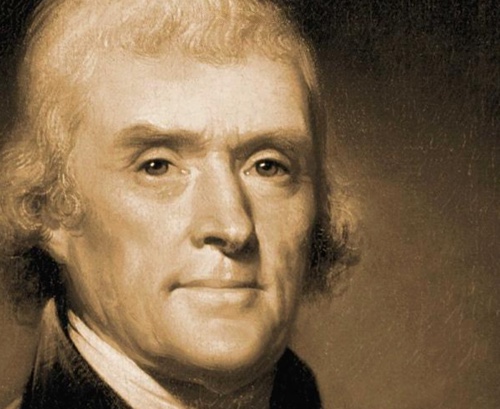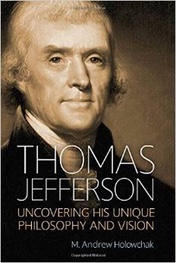Was Jefferson Really a Racist?

Notes on the State of Virginia is Jefferson’s only book, yet scholars seldom carefully read it from cover to cover, and it is mostly used by scholars as a grab bag from which they cull items concerning Jefferson’s views on certain subjects—e.g., agrarianism, meteorology, population growth, paleontology, biotic classification, mineralogy, slavery, race, and religion. Those who have made the book an object of study have in general paid scant attention to the empirical bent of the book—viz., Jefferson’s use of scientific description and explanation as well as hypothesis testing.
 Without question,
Jefferson’s Notes is most popularly used to pin down and
denigrate Jefferson on the issues of race and slavery. In doing so,
Jefferson’s views on both issues are seldom placed in the
etiological context in which they were intended.
Without question,
Jefferson’s Notes is most popularly used to pin down and
denigrate Jefferson on the issues of race and slavery. In doing so,
Jefferson’s views on both issues are seldom placed in the
etiological context in which they were intended.
One such instance is that of Ari Helo and Peter Onuf in their paper, “Jefferson, Morality, and the Problem of Slavery.” They write that black slaves, due to their bondage, were for Jefferson morally inferior to whites. The “bad behavior of slaves” was due to their “disposition to theft.” They sum, “[Jefferson] was chronicling the corruption in morals in a population that had yet to cross the threshold of national identity and moral responsibility.”
Jefferson’s account of blacks in Query XIV begins with a description of their physical and moral characteristics. An “immoveable veil of black”—emanating from the reticular membrane in the scarf-skin or between the skin and scarf-skin, from the color of the blood or the bile, or from some other source—conceals their emotions and is “eternally monotonous.” They are of less “elegant symmetry of form” and do not have flowing hair. They sweat more than whites, “which gives them a strong and disagreeable odor,” but makes them more tolerant of heat and less of cold. They need less sleep, and sit up till midnight even after a hard day’s work. They are more adventuresome and at least as brave as whites, but those things might be due to “want of foresight.” More passionate with their women, they are also less tender and delicate. They grieve transiently, and live more by sensation than by reflection. They are more gifted than whites in music—“with accurate ears for tune and time”—yet it is not yet known whether they are capable of a “more extensive run of melody” or of “complicated harmony.”
Upon the whole, the description, driven by observation as well as assimilation of the skewed views of Enlightenment naturalists—e.g., Cuvier, Buffon, and Goldsmith—who ranked the varied “races” of men according to skin color (from white to black, with white being superior), is certainly not favorable. Jefferson’s conclusion—“that they are inferior in the faculties of reason and imagination”—is certainly also not favorable. Such things readily lend themselves to critical condemnation by today’s scholars. Jefferson’s prejudices color his observations. Jefferson is racist.
Not so fast. We have yet to look at Jefferson’s views of the morality of blacks. Here, let us return to Query XIV, and in doing so, let us keep in mind the condemnatory comments of Helo and Onuf.
Jefferson writes, “In those [endowments] of the heart she [Nature] will be found to have done them justice.” He continues, “We find among them numerous instances of the most rigid integrity, and as many as among their better instructed masters, of benevolence, gratitude, and unshaken fidelity.” Turning to the disposition toward theft to which Helo and Onuf refer, Jefferson states: “That disposition to theft with which they have been branded, must be ascribed to their situation, and not to any depravity of the moral sense. The man, whose favour no laws of property exist, probably feels himself less bound to respect those made in favour of others.” He ends with a problem in the form of a rhetorical question. May not a slave “justifiably take a little from one, who has taken all from him, as he may slay one who would slay him?” The account paints blacks the moral equals of all others. Helo and Onuf’s assessment of Jefferson’s view of the moral inferiority of blacks comes from a skewed reading of Query XIV and is unsustainable.
That Jefferson concedes the moral equality of blacks with non-blacks might seem exiguous—like throwing a bone to a starving dog after one has picked it of its meat—but it is not. It is a prodigious, weighty concession that has never been addressed in the literature. Why? No one has ever done an exhaustive study of the relationship between Jefferson’s faculty of reason and that of his moral sense.
Though Jefferson writes of rationality and moral sensitivity as separate faculties with separate natural “assignments” in his lengthy billet doux to Maria Cosway (12 Oct. 1786), it is clear by his description of the tasks naturally assigned to reason—to square the circle, to trace the orbit of a comet, and to investigate the solid of least resistance—that they are relatively insignificant for daily living and relatively inaccessible to the average person. In contrast, the tasks naturally assigned to the moral sense—actions based on feelings of sympathy, benevolence, gratitude, justice, love, and friendship—comprise the lion’s share of a person’s daily activities and are accessible to all. The notion that moral activity is independent of reason is iterated, for instance, in letters to Peter Carr (12 Oct. 1787), Rev. James Fishback (27 Sept. 1809), and Thomas Law (13 June 1814).
In many letters, Jefferson is clear that reason is a faculty that is subservient to morality—a sentiment derived from the Scottish moral-sense or moral-sentiment theorists such as Hutcheson, Hume, Smith, and Kames that Jefferson read and assimilated. In another letter to Peter Carr (19 Aug. 1785), Jefferson advises his nephew to give up all things, even science, “rather than do an immoral act.” He adds: “I can assure you, that the possession of [science] is, what (next to an honest heart [morality]) will above all things render you dear to your friends, and give you fame and promotion in your own country. … An honest heart being the first blessing, a knowing head is the second.” He tells John Randolph (1 Dec. 1803): “I see too many proofs of the imperfection of human reason, to entertain wonder or intolerance at any difference of opinion on any subject; and acquiesce in that difference as easily as on a difference of feature or form.” Years later, he ingeminates the sentiment in a letter to Edward Livingston (4 Apr. 1824):“These [political] cares [in retirement]… are no longer mine. I resign myself cheerfully to the managers of the ship, and the more contentedly, as I am near the end of my voyage. I have learned to be less confident in the conclusions of human reason.” Finally, Jefferson congratulates Edward Jenner (14 May 1806) for the doctor’s vaccine for yellow fever. “Harvey’s discovery of the circulation of the blood was a beautiful addition to our knowledge of the animal economy, but on a review of the practice of medicine before & since that epoch, I do not see any great amelioration which has been derived from that discovery, you have erased from the Calendar of human afflictions one of it’s greatest.” In short, Harvey’s discovery cannot, as yet, be put to any moral use; it is merely a discovery of interest to the head.
In sum, the moral sense is a much more significant faculty than reason, because reason is given to too few persons; because few human actions are adiaphorous, while most are moral; because the discoveries of reason, not in the service of moral ends, are vagarious; reason is readily used for dark reasons (e.g., politically motivated clerics); and because reason is not the motive of morally correct actions, but the cause of immoral human actions, when it interferes with the moral sense.
We come now to a stout question. Why would Jefferson, if racist, concede the moral equality of blacks with non-blacks, given his view of the superiority of the moral sense vis-à-vis reason? To do so, it seems, would be to make an elephantine concession, which no racist would be likely to make. One answer suggests itself: Jefferson’s analysis of blacks in his Notes was not prejudicial, but—like his analysis of the “Big Buffalo,” Native Americans and their barrows and origins, petrified shells on tops of mountains, Virginia’s caves, syphon fountains, the animals of Virginia, the unexplained phenomenon of looming, and the dew inside brick and stone walls—empirically driven.
If so, we must take Jefferson at his word when he writes of the infeasibility of empirical generalizations: “The opinion, that [blacks] are inferior in the faculties of reason and imagination, must be hazarded with great diffidence. To justify a general conclusion, requires many observations.” While blacks and Native Americans have been the observed for some 150 years, “they have never yet been viewed by us as subjects of natural history.” Thus, we can do no other than “advance it … as a suspicion only, that the blacks … are inferior to the whites in the endowments both of body and mind.” The suspicion, of course, has not stood the test of time, but Jefferson would have happily acknowledged his empirically driven misjudgment, had he been alive today.